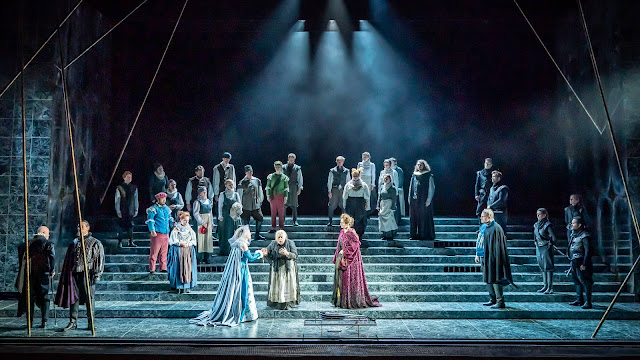 |
| Ponchielli: La gioconda - Act One - Grange Park Opera 2022 (Photo Marc Brenner) |
Ponchielli: La gioconda; Amanda Echalaz, Joseph Calleja, Elisabetta Fiorillo, David Stout, Marco Spotti, director: Stephen Medcalf, the Gascoigne Orchestra, conductor: Stephen Barlow; Grange Park Opera
Reviewed 16 June 2022, (★★★★)
A rare chance to hear Ponchielli's best-known opera in a large-scale and dramatic staging featuring a strong array of voices
There were plenty of opera composers in Italy in the 19th century, but few wrote operas that have managed to stay in the repertoire and it is Verdi who dominated then and certainly dominates now. Between Donizetti's Caterina Cornaro (premiered in Naples in 1844) and Mascagni's Cavalleria Rusticana (premiered in Rome in 1890), few new operas by composers other than Verdi have managed to remain in the repertoire. One of these is Ponchielli's La gioconda (premiered 1876, revised 1880), though its hold on the repertoire is fragile. Opera North staged it (with Rosalind Plowright in the title role in 1993, and revived with Clare Rutter in 2000), the Royal Opera gave it in concert in 2004, and Opera Holland Park staged it in 2008. Our most recent encounter with the opera was in Brussels in 2019 [see my review]. Grange Park Opera planned to stage the work in 2020, and now finally this has come to pass.
We caught Grange Park Opera's performance of Ponchielli's La gioconda on Thursday 16 June 2022. Directed by Stephen Medcalf, it featured Amanda Echalaz as Gioconda, Joseph Calleja as Enzo Grimaldi, Elisabetta Fiorillo as La Cieca, David Stout as Barnaba, Marco Spotti as Alvise Badoero and Ruxandra Donose as Laura. Stephen Barlow conducted the Gascoigne Orchestra. Designs were by Francis O'Connor, movement by Sarah Fahie and lighting by Tim Mitchell.
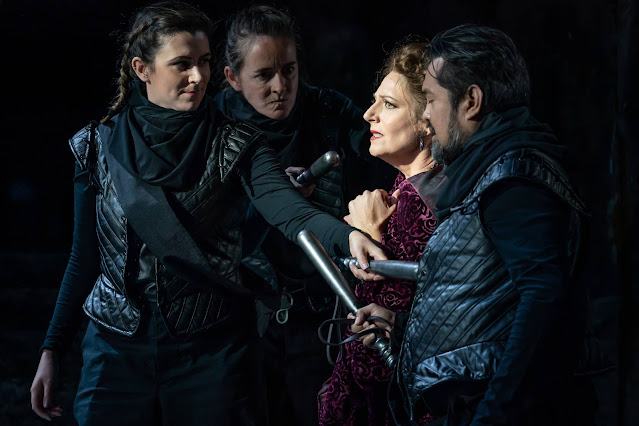 |
| Ponchielli: La gioconda - Amanda Echalaz - Grange Park Opera 2022 (Photo Marc Brenner) |
It is tricky to understand La gioconda without comprehending the vogue for French Grand Opera that spread in Italy from the 1860s. Verdi wrote Les vêpres siciliennes for the Paris Opera in 1855 and would write Don Carlos for them in 1867. Between these two he wrote Un ballo in maschera, in many ways an exercise in transmuting French Grand Opera (historical setting, strong cultural or social divide keeping lovers apart, significant use of dance, lavish setting, large choruses) into something Italian. Meyerbeer's operas had started appearing in Italy, with premieres of three in Florence in the 1840s and early 1850s, Halevy's La Juive premiered in Genoa in 1858 and L'Africana was a success at its first outing on Bologna. In the 1860s a Florentine publisher was producing pocket scores of the Meyerbeer operas, the operas were popular with musicians, and critics were starting to compare Verdi's operas unfavourably with those of Meyerbeer.
La gioconda is Ponchielli and his librettist, Boito (writing under a pseudonym) responding to this. The opera is large scale (four acts, over three hours of music), there are dance episodes in Act One and a major ballet in Act Three, the setting is historical (Venice in the 17th century) with politics keeping the lovers apart. Like many classic French Grand Operas, it has two major female roles, though unusually the young female lover, Laura, is not a soubrette but a mezzo-soprano. It is based on a French play, Victor Hugo's Angelo, Tyrant of Padua. But the style and pacing is very Italian.
Ponchielli and his music would have big influence on the Italian composers of the 1890s, what know as the Verismo school. And in La gioconda we can see elements of this; in the first couple of acts, Ponchielli's use of aria is sparing, his musical numbers are often diagetic (ie music which is sung as part of the plot) and the plot is expounded in lyric dialogue. Though Ponchielli could write hit tunes, perhaps one of the reasons why the opera struggles is that there are few arias that you come out of the theatre humming.
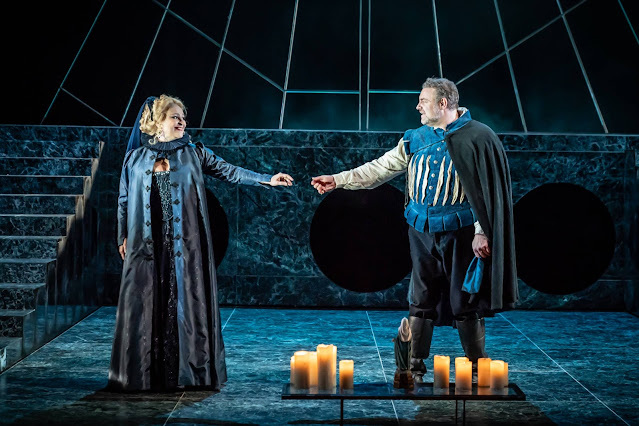 |
| Ponchielli: La gioconda - Ruxandra Donose, Joseph Calleja - Grange Park Opera 2022 (Photo Marc Brenner) |
The production loosely kept the 17th century setting and Francis O'Connor's striking costumes included many period details, but the sets were far more abstract. There was something slightly retro about the production, with its mix of period dress and abstract set. O'Connor had produced a basic set that featured a huge set of stairs stretching the full with of the stage but which retracted and this produced a series of highly inventive spaces, with backdrops to bring character - abstract sails for Act Two, a gilded curtain for Act Three, a spider's web for Act Four. All this was rendered extremely atmospheric and often dramatic by Tim Mitchell's fine lighting.
In Act One, we eventually had the Lion's Mouth (where Barnaba posts his anonymous letter to the Inquisition), but initially there was simply the black cyclorama, and the staircase. This caused the opening of the opera, meant to be Carnival celebrations in Venice, to seem rather spare, particularly as the chorus by no means filled the staircase to bursting which gave the scenes a bleak feel and Medcalf did seem to be emphasising the repression of the regime rather than the good time element of Venice at Carnival. Beyond the image of victims on the spider's web towards the end of the opera, Medcalf's production was non-interventionist. He took the story and expounded it admirably, an approach which has a lot going for it in a production of a rarely performed opera. Though I have always felt that with La gioconda a little interventionist back story might help, we begin the whole thing in media res, Barnaba is evil for the sake of it (with plenty of pre-echoes of Iago) and obsessed with Gioconda the singer (pre-echoes of Scarpia and Tosca here), and Gioconda is in love with Enzo (though there is never a proper love scene). A few directorial glosses would not come amiss.
As Gioconda, Amanda Echalaz had a big, dramatic, gutsy voice and encompassed the challenges of this big role with ease. She has an attractive resinous edge to the voice which, combined with some very Italian breaks between the registers, gave her performance a distinct sense of colour. Her Gioconda was over the top, big, dramatic and intense, all the things the role needs. This is not a particularly subtle role, and Echalaz embraced that in spades. She was less successful at the lyrical moments, a tendency to push out individual notes and phrases meant that we missed moments of lyrical line and quiet tenderness. But she was also a mesmerising stage performer, commanding and dramatic, so that we always knew she was there.
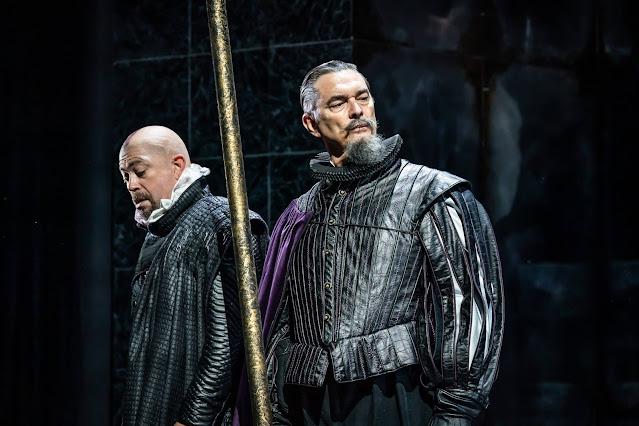 |
| Ponchielli: La gioconda - David Stout, Marco Spotti - Grange Park Opera 2022 (Photo Marc Brenner) |
As her love interest, Joseph Calleja displayed his lovely golden voice, wrapping Enzo's nasty, two-timing character in a wonderful warm glow. Enzo might be a man you would not trust as far as you could throw him, but when Calleja was singing he made you believe. This Enzo seduced easily with his voice. Dramatically Calleja is not the most compelling stage animal, and Medcalf seems to have been content to let Calleja be, and Enzo actually has little real role in the drama. This comes from Gioconda and Barnaba.
As Barnaba, David Stout completely embraced the character's evil and obsessive nature. Often physically contorted, Stout gave voice to this dramatic character in a mesmerising way. The physical expressiveness combined with some superb singing and a strongly characterful performance. Stout was rarely tempted to distort the musical line for character's sake, which meant that there was a great deal here to enjoy.
The role of Laura requires a singer who can encompass the role's dramatic mezzo-soprano writing and still be convincing as the work's primary love interest. Ruxandra Donose certainly encompassed both of these. She did not try to be sixteen, this was an opera about a love triangle amongst mature people, and it worked well. And this was a finely sung role too, Donose's roles stretch from dramatic mezzo to Bellini's Norma and Baroque opera, and this drama and flexibility counted for a lot so that we really believed in her.
Elisabetta Fiorillo made a terrific La Cieca, convincingly old and blind but never infirm of voice, Fiorillo made you believe in La Cieca as a character, someone who has been very strong-minded in the past and is now brought down by infirmity. Fiorillo's contributions to the ensemble scenes were terrific. Another relatively small but important role was played by Marco Spotti as Laura's husband Alvise. Spotti sang with wonderfully commanding tones throughout, and made you believe in this man as the leader of the inquisition and someone who thought himself above the law.
The smaller roles were all well taken with Toki Hamano as one of the boatmen in Act One, Jonathan Kennedy as a pilot, Eugene Dillon-Hopper as a singer and James Schouten as a scribe who seemed to be Barnaba's side-kick.
 |
| Ponchielli: La gioconda - dancers in Act Three, The Dance of the Hours - Grange Park Opera 2022 (Photo Marc Brenner) |
One of the most famous elements in the opera is a non-singing one, the ballet The Dance of the Hours. This performance was the first time that I had seen the ballet included in the work, and whilst it is not imperative dramatically it makes sense in the context of Act Three whereby Alvise provides entertainment whilst he believes that his wife is dying, and the ballet, as originally intended, represented the hours of dawn, day (morning), twilight and night, symbolising the eternal struggle between the forces of light and darkness.
For many people The Dance of the Hours conjures up images of the Disney film, but that did not pay a significant role in my childhood. What did, however, was Allan Sherman's 1963 hit song, Hello Muddah, Hello Fadduh (A Letter from Camp), and when I hear 'that' melody I don't think of dancing hippos, I think of Sherman's song!
As it was, here we had a charming send-up of classical ballet by choreographer Sarah Fahie with dancers Lauren Bridle, Thomas Goodwin, Bridget Lappin, Arianne Morgan, Ryan Monroe, Luke Murphy, Bailey Pepper and Jay Yule. Fahie used the switch about of two dancers, one male and one female, both dressed the same, to cause amusement. It was charmingly imaginative fun, the problem was that it just did not feel like the sort of entertainment that Alvise Badoero would provide for his guests!
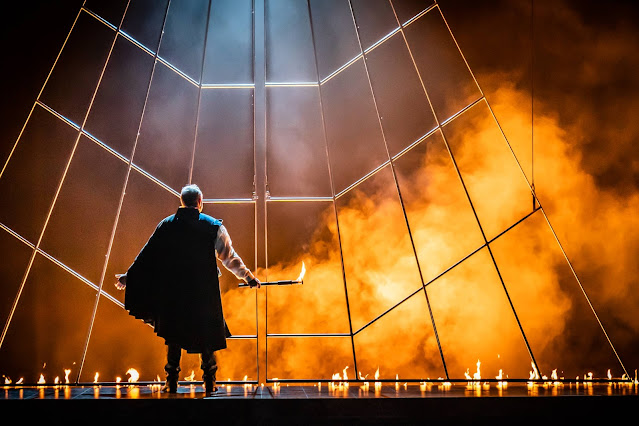 |
| Ponchielli: La gioconda - Joseph Calleja in Act Two - Grange Park Opera 2022 (Photo Marc Brenner) |
The chorus was hard working, providing carnival revellers, sailors, and party guests, singing and dancing and making a strong noise.
In the pit, Stephen Barlow clearly understood the structure of the work, and the whole opera worked as a dramatic arc. Unfortunately, at times his speeds seemed to be somewhat too relaxed and you wanted a bit more impulse and impetus. Perhaps this was simply to give the singers the time they needed in this dramatic music, but it is a long opera and extra impulse would have been welcome. However, the Gascoigne Orchestra played well for him, and the sound was detailed and full. The orchestra is based on the one that played at Garsington from 1993 to 2018, and first appeared at Grange Park, under its new name, in 2021. This year, the Gascoigne Orchestra is playing for all the operas except for Janacek's Mr Broucek which features the BBC Concert Orchestra
Never miss out on future posts by following us
The blog is free, but I'd be delighted if you were to show your appreciation by buying me a coffee.
Elsewhere on this blog
- Rising to the challenge: the Young Artists of the National Opera Studio in Sondheim: Before & After - opera review
- Vivid & vibrant: Poul Ruders' Harpsichord Concerto from Mahan Esfahani, Aarhus Symphony Orchestra, Leif Segestam - record review
- Young Artists performance of Tchaikovsky's Eugene Onegin at Opera Holland Park - opera review
- On a highly concentrated scale: Verdi's Macbeth at The Grange Festival - opera review
- Baroque mind games: Handel's Tamerlano at The Grange Festival - opera review
- Violinist Midori Komachi has not only recorded Vaughan Williams' Violin Sonata but is planning performances of the composer's music in Japan - interview
- A romantic woodland walk with Igor Levit and Simon Bode at Wigmore Hall - concert review
- i berzs, i smilgas... (and a birch and grasses...) - Latvian song across the generations from Emils Melngailis & Kristaps Petersons - record review
- Precious Things: a lovely survey of Bernard Hughes' recent choral music from Epiphoni Consort on Delphian - record review
- Hearing with new ears: Italian pianist Pina Napolitano wants her Conway Hall recital Tempo e Tempi to make the music of Carter more familiar and that of Beethoven more unfamiliar - interview
- Returning the work to its Opera Comique roots: an engaging new Carmen from Opera Holland Park that adjusts tradition rather than reinventing it - opera review
- Emotional atmospheres: a wonderfully lucid production of Tchaikovsky's Eugene Onegin opens Opera Holland Park's 2022 season - opera review
- Real music-making of the highest standards: the Swiss youth orchestra "il mosaico" is caught on tour in Italy by composer Edward Lambert - concert review
- Home

.jpg)









No comments:
Post a Comment